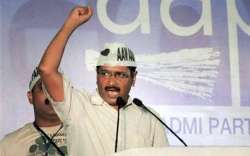AAP Report Card: Water pipelines in Delhi slums still a dream
The Aam Aadmi Party (AAP), which stormed into Delhi politics on the plank of providing piped water to all, has not and may not be able to provide piped water connection to over 650 JJ clusters and 100 unauthorised colonies in the city anytime soon, as the tenure of the Arvind Kejriwal government will end in February 2020.

The Aam Aadmi Party (AAP), which stormed into Delhi politics on the plank of providing piped water to all, has not and may not be able to provide piped water connection to over 650 JJ clusters and 100 unauthorised colonies in the city anytime soon, as the tenure of the Arvind Kejriwal government will end on February 2020.
According to government data, of the total 675 JJ (jhuggi jhopri) clusters in the city, the technical feasibility exists for only 364 and the government has been able to provide water to only seven of these clusters.
"Till March 2019, seven JJ clusters have been provided water pipeline and the work is underway in few others," according to the a Delhi Jal Board (DJB) data.
Similarly, there are 1,725 unauthorised colonies in Delhi out of which 1,594 are eligible for water connections. While the no-objection certificates (NOCs) are not available for 95 unauthorised colonies, work is not feasible in 36 others.
"A total of 1,374 unauthorised colonies got water pipeline till 2018-19," according to the official data, while till 2013, only 791 unauthorised colonies had piped water.
In its 2015 Assembly poll manifesto, the AAP had promised that it will make clean drinking water a right of the people and will provide universal access to clean drinking water to all citizens of Delhi at an affordable price.
"The AAP will make a time-bound plan of action for covering all residents of Delhi with piped water and sewage network in all parts irrespective of their legal status. There will be no discrimination between planned/non-planned; authorized/ non-authorized; regularized/ non-regularized; city or village," the party manifesto read.
AAP swept the Delhi Assembly polls by winning 67 of the 70 seats and Arvind Kejriwal became the Chief Minister on February 2015. The city will again go for polls in early next year, with Kejriwal's tenure ending in February 2020.
Even after 4.5 years of AAP rule, the residents of several clusters and colonies are dependent on DJB and private tankers or illegal borings.
A DJB official said the Board has to take an NOC from the landowning agency before laying water pipelines in any area.
"Several agencies (like the Forest Department and the ASI) are not giving NOCs for laying water pipelines if an authorised colony comes up on its land," the official said.
The official said till March 2019, the DJB has provided piped water to 99 per cent of the 189 rural villages in the national capital.
The DJB also claimed it has provided piped water to all the 45 resettled colonies and all the 135 urban villages of the city.
The Kejriwal government is aiming to get rid of the compulsion to take water from tankers by March 2020. The government has set March 2020 as the target to connect a total of 1,525 unauthorised colonies in Delhi with water pipeline connection, according to the government.
The DJB official said that in the last four years, the Board has linked 406 unauthorised colonies to the water supply network, including colonies like Dwarka, where there was no drinking water until 2015.
"Work to lay new water pipelines is on in another 142 unauthorised colonies," the official said.
Delhi Finance Minister Manish Sisodia has spoken about piped water supply to JJ clusters and unauthorised colonies in almost all the Budgets since 2015.
While in 2015-16, he said his government is committed to providing piped drinking water supply to each household. Still, more than 800 unauthorised colonies depend on water tankers to meet their daily water requirements.
"Piped water supply will be extended to all these unauthorised colonies in Delhi in a time bound manner in the next three years," he said.
While presenting the next year's Budget, he said it is extremely unfortunate that people in parts of Delhi are dependent on water tankers for their water supply.
"In-spite of tall promises made by the successive Governments, clean drinking water has remained a dream for large sections of society. Our Government has taken a historic decision to provide clean drinking water supply to each and every household by December 2017," Sisodia said in 2016.
Till 2016-17, 1,144 unauthorised colonies had piped water.
In the manifesto, the AAP has also announced it will give free water up to 20,000 litres per month.
According to government data, around 14 lakh families have benefited from this scheme.
The government also claimed that the scheme has encouraged people to save water.
"Prior to the implementation of this plan in 2015, there were five lakh families who used to spend less than 20,000 litres of water per month, but now the number has increased to around 14 lakh," the government data suggest.
Also Read | Several Congress workers join Aam Aadmi Party
Also Read | Aam Aadmi Party a 'sinking ship', says BJP's Vijender Gupta